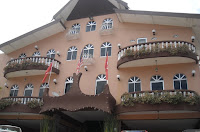We woke quite late at 8am. We had a half an hour trip to
Pengkalan Kubor, so we jumped into an invigorating cold shower, packed our bags
and headed over to breakfast at 8.30am. It’s at Kopitiam Kita again. We had hot
tea and milo, nasi ayam gulai Kak Wok, nasi lemak, chicken curry puff and nasi
dagang with chicken curry.
We left Kota Bharu at around 10am in Mr. Nazaruddin’s (Hub’s friend) Mercedes
Benz and arrived in Tumpat at 10.30am. There are also Buddhist temples in Tumpat.
Pengkalan Kubor is located at Golok River estuary
and bordered with Tak Bai of Thailand. There is no bridge joining Tak Bai
and Pengkalan Kubor. The residents of both border towns cross the river by boat
or Ferry.
Tak Bai Town
It is another duty free zone and
popular for electronic goods, kitchen wares and clothes. Apart from clothing, a wide range of foods are also available
at Pengkalan Kubor Duty Free Zone. We
bought a Muay Thai shorts for Ben, my nephew, a teapot set and brass betel set.
My children stocked up on water and chocolates.
On the way back to Kota Bharu, we stopped off at Kampung
Laut, Tumpat to buy etak or etok and got to taste it the way the Kelantanese has been enjoying it for
generations. According to Mr. Nazaruddin, etok
is a freshwater clam which lives at the bottom of rivers and canals. Mostly found in the shallows and
sandy parts of the river and only in fresh waters as it is very sensitive to the quality of the water. Mainly eaten as appetizer to
go with rice especially nasi kerabu. We were told that the etak at
Kampung Laut are special as they are roasted in the hot sun after marinating it
in a paste made of salt, blended with lemon grass, shallots, ginger and garlic.
This way will ensure that the flesh will be succulent enough. The marinating
process takes at least an hour. Before marinating it, the etak must be
washed clean and soaked in clean water. The soaking will make the etak purge
all sand particles and mud within itself which may make it feel gritty when
eating it if it is not totally purged. Soaking it over a minimum of 3 hours is
necessary and overnight will be best. Mr. Nazaruddin even taught us how to open
the etak with our teeth. Another friend of Hub, Hj Akmal, taught us to open it with the
sharp edge of the shell, use it the same way as a knife.
Mr. Nazaruddin then took us to Warung Pak Mat Pulau Pisang which is located at
the Medan Ikan Bakar Kedai Buloh spot near Pantai Cahaya Bulan for lunch. This place is famous for its teh tarik madu (honey milk tea) and fish head soup. Pak Mat uses madu (honey) for natural
sweetness to the teh tarik drink instead of condensed or evaporated milk. This
results in the drink being so bubbly that it overflows over the glass. Worth a try. Have it together with their signature dish which
is steamed
fish head served in beef stock. Match
made in heaven. Sounds a bit weird but the taste is beyond imagination. The fish head was so fresh, flesh was really sweet, soup was done
perfectly and a bit lemony tastes with a hint of chilly...Heavenly..!! Apart from the teh tarik
madu, Mr. Naza also ordered daging korban goreng kunyit and omelette with white rice. Overall the soup
and all the dishes were really good. No disappointment. Best in the world!
On
the way back to Kota Bharu, we stopped off at Kampong Kedai Buloh (Che Faridah
Che Ahmad Tok She) to buy some raw and freshly made fish crackers to bring
home.
We then made a stop at Che Minah Songket,
at Kampong Penambang. Cik Minah Songket is a renowned songket and
weaving company in Kelantan that has been around since the 1930s. They
sell songket in various designs, batik and local handicraft
Mr. Nazaruddin dropped us at the hotel and we then rushed to Istana Jahar before they closed
for the day. It is a royal residence. It was built in 1855 by Sultan Muhammad II of Kelantan
for his grandson Long Kundur. The palace has a pentagon-shaped and it is
currently houses the Museum of Royal Traditions and Customs of Kelantan.
Then off to Bank Kerapu at Jalan Pejabat Pos Lama. This building was built by Mercantile Bank in
1912. In 1941, Japanese troop landed near Kota Bahru. During the occupation,
Bank Kerapu was used by the Japanese as their police station for war
coordination. Upon the fall of Japan and the return of British, Bank Kerapu
continued to function as bank until 1992 when it was turn into a war memorial
by the Kelantan Museum Corporation. It houses more than 1,000 exhibits relating
to the war and a mixture of Japanese tool used during the occupation, including
Japanese bicycle, photographs, articles and artifacts.
It had been a long day, so
we made our way to the hotel and cooled down with a cold shower. We were so tired so we had to decline Mr. Nazaruddin’s invitation for dinner at Yati Ayam Percik but he was so generous to buy for us Yati’s signature dish which is Ayam Percik (grill chicken with
special coconut gravy) and ikan percik (grill fish) for dinner. Then at around
9.30pm Hub and my son then went to Kedai Kopi White House to buy rice to eat
with the scrumptious ayam and ikan percik.
Full and exhausted, we finally climbed into bed and crashed.


































No comments:
Post a Comment